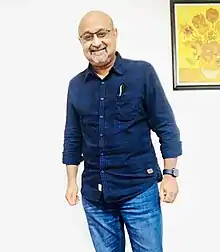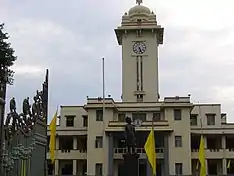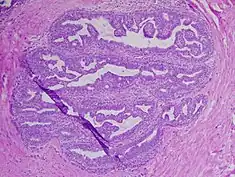M. Radhakrishna Pillai | |
|---|---|
 | |
| Born | 18 August 1960 Kerala, India |
| Nationality | Indian |
| Alma mater | |
| Known for | Studies on papilloma viruses |
| Awards |
|
| Scientific career | |
| Fields | |
| Institutions | |
Madhavan Radhakrishna Pillai (born 18 August 1960) is an Indian cancer biologist and the former director of the Rajiv Gandhi Centre for Biotechnology. Known for his studies on papilloma viruses, Pillai is an elected fellow of the Indian Academy of Sciences, National Academy of Sciences, India, Royal College of Pathologists and the National Academy of Medical Sciences. The Department of Biotechnology of the Government of India awarded him the National Bioscience Award for Career Development, one of the highest Indian science awards, for his contributions to biosciences in 2002.[1]
Biography

Born on 18 August 1960 in the south Indian state of Kerala,[2] Radhakrishna Pillai earned a PhD in tumor immunology from the University of Kerala[3] and did his post-doctoral work in molecular biology and immunopharmacology at the University of Arizona.[4] Returning to India, he joined the Regional Cancer Centre, Thiruvananthapuram in his home state where he served as the head of the Department of Molecular Medicine, Drug Development and Chemoinformatics.[5] In 2005, when he was appointed as the director of Rajiv Gandhi Centre for Biotechnology (RGCB) at the age of 44, he became the youngest director of a national research institution in India, and he holds the post till date.[6][7]
Legacy

Pillai chairs the Institutional Committee for Stem Cell Research of Sree Chitra Tirunal Institute for Medical Sciences and Technology and sits in the research advisory panels, scientific advisory councils or academic committees of the National Institute of Immunology, India, National Centre for Cell Science, Sree Chitra Tirunal Institute for Medical Sciences and Technology and Translational Health Science and Technology Institute.[3] He is an executive committee member of the Kerala State Council for Science, Technology and Environment, an autonomous body established to promote technological development n the state by the Government of Kerala. He is also associated with other state government bodies such as Kerala Biotechnology Commission, Kerala Biotechnology Board and Kerala State Innovation Council as a member[8] and with the University of Kerala as a member of its Senate, nominated by the vice-chancellor.[9]
Pillai, a former president of the Society of Biotechnologists, India (SBC), is known to have worked on human papillomavirus as well as cervical cancer[10] and is the coordinator of two programs of the Department of Biotechnology, namely National Cervical Cancer Control Program and Papillomavirus Vaccine Development Program.[5] As the head of RGCB, he coordinated with Emory Vaccine Center of Emory University on a program of drug development for Influenza A virus subtype H1N1 and the initiative was successful in developing a peptide found in the skin mucus of Hydrophylax bahuvistara, a species of a frog common in the Western Ghats.[11] The program continues its research on drug development for viral infections such as dengue and chikungunya. He has been one of the principal investigators of a program of the Department of Biotechnology for developing a mouthwash for oral mucositis based on various plant extracts for which patent is pending.[12] He holds a patent for Novel porphyritic derivatives for photo dynamic therapy (PDT): A process for the preparation and thereof and their use as PDT agents and fluorescence probes for biological applications, a process jointly developed along with his colleagues at RGCB.[13] Diseases like Oral dysplasia, oral leukoplakia, breast cancer, Human papillomavirus infection, oral carcinomas and swine fever and drug discoveries against these diseases are some of his other research interests.[14] His studies have been documented by way of a number of articles[15][16][note 1] and the online article repository of the Indian Academy of Sciences has listed 60 of them.[17] Besides, he has edited one book, Mechanisms of Vascular Defects in Diabetes Mellitus[18] and has contributed chapters to books published by others.[19] He has also mentored several research scholars in their studies.[10]
Awards and honors
Pillai received the Raja Ravi Sher Singh Award of the Indian Council of Medical Research in 1991 for the research work done in connection with his doctoral studies.[3] The Department of Biotechnology of the Government of India awarded him the National Bioscience Award for Career Development, one of the highest Indian science awards in 2002.[1] Two years later, the Indian Academy of Sciences elected him as a fellow (2004)[2] and the National Academy of Sciences, India made him their fellow the following year (2005).[20] He is also a fellow of the National Academy of Medical Sciences and the Royal College of Pathologists.[6] The award orations delivered by him include the 2000 edition of the Sandoz Oration of the Indian Council of Medical Research.[21]
Selected bibliography
Books
- C.C. Kartha; Surya Ramachandran; Radhakrishna M. Pillai (1 August 2017). Mechanisms of Vascular Defects in Diabetes Mellitus. Springer. ISBN 978-3-319-60324-7.
Chapters
- Perumana R. Sudhakaran (Ed.); T. R. Santhosh Kumar, M. Radhakrishna Pillai (Chapter authors) (25 October 2013). "Tumour Stem Cell Enrichment by Anticancer Drugs: A Potential Mechanism of Tumour Recurrence". Perspectives in Cancer Prevention-Translational Cancer Research. Springer Science & Business Media. pp. 9–. ISBN 978-81-322-1533-2.
Articles
- M Radhakrishna Pillai (2013). "Establishing and maintaining biobanks: experience of Rajiv Gandhi Centre for Biotechnology, (RGCB) Trivandrum". BMC Proceedings. 7 (suppl 5) (16): O16. doi:10.1186/1753-6561-7-S5-O16. PMC 3892675.
- Reshmi, G.; Radhakrishna Pillai, M. (2008). "Beyond HPV: oncomirs as new players in cervical cancer". FEBS Letters. 582 (30): 4113–4116. doi:10.1016/j.febslet.2008.11.011. PMID 19032954. S2CID 29106828.
- Hariharan, Ramkumar; Radhakrishna Pillai, M. (2006). "Homology modeling of the DNA-binding domain of human Smad5: a molecular model for inhibitor design". Journal of Molecular Graphics and Modelling. 24 (4): 271–277. doi:10.1016/j.jmgm.2005.09.009. PMID 16243555.
See also
Notes
- ↑ Please see Selected bibliography section
References
- 1 2 "Awardees of National Bioscience Awards for Career Development" (PDF). Department of Biotechnology. 2016. Archived from the original (PDF) on 4 March 2018. Retrieved 20 November 2017.
- 1 2 "Fellow profile". Indian Academy of Sciences. 12 November 2017. Retrieved 12 November 2017.
- 1 2 3 "Director profile". Rajiv Gandhi Centre for Biotechnology. 5 December 2017. Archived from the original on 6 December 2017. Retrieved 5 December 2017.
- ↑ "Radhakrishna Pillai new director of RGCB". The Hindu. 18 February 2005. Retrieved 5 December 2017.
- 1 2 "New Director for RGCB". The Hindu - Business Line. 19 February 2005. Retrieved 5 December 2017.
- 1 2 Author Profile. Springer. 1 August 2017. pp. 1–. ISBN 9783319603247. Retrieved 5 December 2017.
- ↑ "Growing on international collaborations". Biospectrum India. 5 December 2017. Retrieved 5 December 2017.
- ↑ "Members of the Council". Kerala State Innovation Council. 5 December 2017. Archived from the original on 6 December 2017. Retrieved 5 December 2017.
- ↑ "Nine Members (To be nominated by the Chancellor)". University of Kerala. 5 December 2017. Retrieved 5 December 2017.
- 1 2 "External Research Supervisor". Centre for Bioinformatics. 5 December 2017. Retrieved 5 December 2017.
- ↑ "RGCB scientists help isolate H1 flu-slayer from frog skin". Times of India. 21 April 2017. Retrieved 5 December 2017.
- ↑ "Mouthwash for Oral Mucositis based on various Plant Extracts". C-Camp - Department of Biotechnology. 5 December 2017. Retrieved 5 December 2017.
- ↑ "Novel porphyritic derivatives for photo dynamic therapy (PDT): A process for the preparation and thereof and their use as PDT agents and fluorescence probes for biological applications". Rajiv Gandhi Centre for Biotechnology. 5 December 2017. Archived from the original on 6 December 2017. Retrieved 5 December 2017.
- ↑ "Investigator Page". Indian Cancer Research Database. 5 December 2017. Retrieved 5 December 2017.
- ↑ "On ResearchGate". 23 November 2017. Retrieved 23 November 2017.
- ↑ "On Google Scholar". Google Scholar. 23 November 2017. Retrieved 23 November 2017.
- ↑ "Browse by Fellow". Indian Academy of Sciences. 21 November 2017. Retrieved 21 November 2017.
- ↑ C.C. Kartha; Surya Ramachandran; Radhakrishna M. Pillai (1 August 2017). Mechanisms of Vascular Defects in Diabetes Mellitus. Springer. ISBN 978-3-319-60324-7.
- ↑ Perumana R. Sudhakaran (Ed.); T. R. Santhosh Kumar, M. Radhakrishna Pillai (Chapter authors) (25 October 2013). "Tumour Stem Cell Enrichment by Anticancer Drugs: A Potential Mechanism of Tumour Recurrence". Perspectives in Cancer Prevention-Translational Cancer Research. Springer Science & Business Media. pp. 9–. ISBN 978-81-322-1533-2.
- ↑ "NASI fellows". National Academy of Sciences, India. 12 November 2017. Archived from the original on 4 March 2016. Retrieved 12 November 2017.
- ↑ "Sandoz Oration Award" (PDF). Indian Council of Medical Research. 2000. Archived from the original (PDF) on 10 April 2009. Retrieved 5 December 2017.
Further reading
- Pillai, M. Radhakrishna (5 December 2017). "Message From Director". Rajiv Gandhi Centre for Biotechnology. Retrieved 5 December 2017.
External links
- Ethier, Stephen P. (18 June 2000). Endocrine Oncology. Springer Science & Business Media. pp. 318–. ISBN 978-1-59259-223-4.
- Pratyoosh Shukla (7 November 2017). Recent advances in Applied Microbiology. Springer. pp. 41–. ISBN 978-981-10-5275-0. Retrieved 5 December 2017.